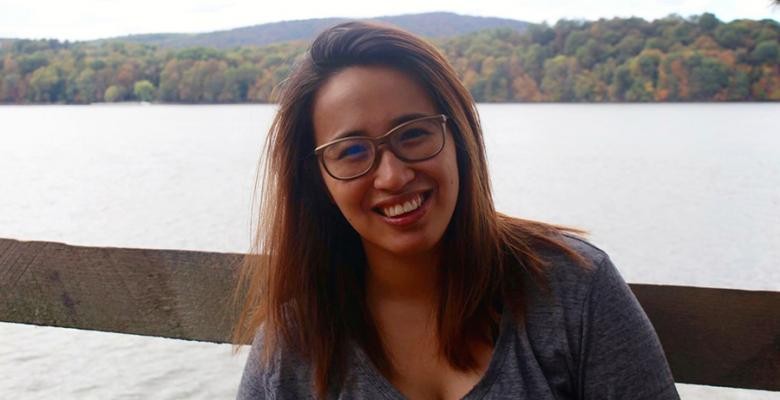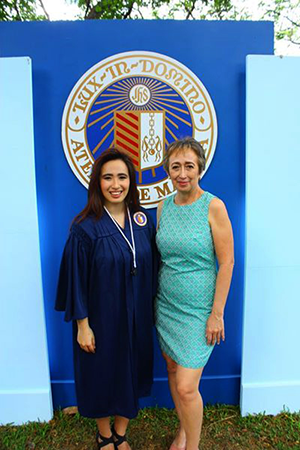Putting Ideas to Action: Jemima Mendoza Works on Climate Change

When Jemima Mendoza was a freshman at the Ateneo de Manila University in the Philippines, Typhoon Ketsana devastated the capital, taking more than 700 lives and flooding nearly 80 percent of the metropolitan area.
It was 2009 and Mendoza was living on campus, which was atop a plateau. “I could see the city all covered in brown water,” Mendoza recalled. “I was not emotionally prepared for it.”
She rolled up her sleeves, working with the Jesuit university community to set up an on-campus disaster response center providing food, shelter, and other aid for people affected by the disaster.
“Ketsana changed my whole perspective on life,” said Mendoza, who on May 16 receives a master’s degree in environmental science and policy from Columbia’s School of International and Public Affairs.
When the typhoon hit, Mendoza was majoring in European studies and planned to become a diplomat. Her experience led her to ask questions, such as why certain areas were affected by flooding more than others, and why the response to rescue victims was so slow.
She believed part of the solution existed in policy, but “my college didn’t have a climate policy program.” So Mendoza spent her remaining time at Ateneo finding a climate change angle to all her international relations-related assignments.
After earning her bachelor’s degree in 2014, Mendoza worked with the Filipino delegation that negotiated the United Nations’ Paris climate accord. Then she worked for Greenpeace Southeast Asia on campaigns to discourage reliance on coal and single-use plastics.
Mendoza still wanted to strengthen her scientific knowledge about climate change. In researching educational opportunities, she found Columbia’s interdisciplinary program in environmental science and policy, a joint offering by the SIPA and the Earth Institute, leading to a master’s degree in public administration.
“Columbia had the resources I wanted,” she said, citing the Earth Institute, Lamont-Doherty Earth Observatory, and the Sabin Center for Climate Change Law. “And it’s in New York City, a leader in climate action in a highly urbanized location.”
The one-year program she began last summer attracted a diverse group of students from fields like agriculture and law, which Mendoza said made her think about different ways to influence change. “Climate justice is broad and intersectional on a level that impacts everyone,” said Mendoza. “But on the grassroots level there are things that are unique to each community. So it’s a good place to apply data and development.”
The program’s director, Steven Cohen, said “environmental policy is a place where naturally you need people from different disciplines to think of solutions.” He added, “to be a sustainability professional, you need to have knowledge of a lot of different fields - ecology, climate, toxicology, and then we teach them management and statistics.”
The program gives students an opportunity to apply what they learn to new areas in workshop projects. In one such project, Cohen selected Mendoza as the manager because, he said, not only did she possess the right set of knowledge but she had “intangible qualities” that make her a good leader.

For the project, Mendoza worked with the New York City Mayor’s Office of Media and Entertainment, developing policies and guidelines to make film production more sustainable. She produced a study with recommendations for donating surplus food to the homeless and tax incentives, which she hopes will have a direct environmental impact and help with long-term economic growth through the Film Green program.
Mendoza learned her sense of duty from her mother, who was civically active throughout her youth when the Philippines was under martial law. “My mom was a catalyst in our family and taught my siblings and me that we didn’t have to follow traditional career paths,” said Mendoza. “She told us to ‘forge your own path’ because we can serve other people through whatever field.”
For Commencement, her mother and three siblings, and maybe even their dog, will be coming from the Philippines to see Mendoza get her degree.
The newly-minted graduate has decided to join the executive team of the World Resources Institute’s in Washington, D.C., a global research organization focused on environmental sustainability, health and economic opportunity. Although she will be far from home, she said, “Climate change doesn’t have borders. Wherever I work, it will impact the Philippines.”